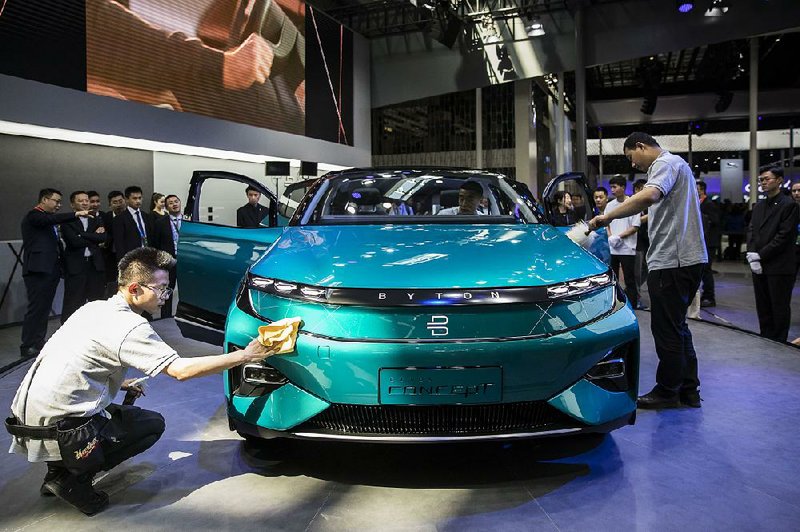On a bright spring day in Amsterdam, car buffs stepped inside a blacked-out warehouse to nibble on lamb skewers and sip rhubarb cocktails courtesy of Lynk & Co., which was showing off its new hybrid SUV.
What seemed like just another launch of a new vehicle was actually something more: the coming-out party for China's globally ambitious auto industry. For the first time, a Chinese-branded car will be made in western Europe for sale there, with the ultimate goal of landing in U.S. showrooms.
That's the master plan of billionaire Li Shufu, who has catapulted from founding Geely Group as a refrigerator maker in the 1980s to owning Volvo Cars, British sports carmaker Lotus, London Black Cabs and the largest stake in Daimler AG-the inventor of the automobile. Li is spearheading China's aspirations to wedge itself among the big three of the global car industry -- the U.S., Germany and Japan -- so it becomes the Big Four.
"I want the whole world to hear the cacophony generated by Geely and other made-in-China cars," Li told Bloomberg News. "Geely's dream is to become a globalized company. To do that, we must get out of the country."
He's not alone. At least four Chinese carmakers and three Chinese-owned startups -- SF Motors Inc., NIO and Byton-plan -- are to sell cars in the U.S. starting next year. At the same time, Warren Buffett-backed BYD Co. is building electric buses in California; Baidu Inc. is partnering with Microsoft, TomTom NV and Nvidia Corp. on a self-driving platform; and Beijing-based TuSimple Inc. is testing autonomous-driving big rigs in Arizona.
The industry is set for more upheaval as China unravels a two-decade policy that capped foreign ownership of carmaking ventures at 50 percent. The change may energize companies such as Volkswagen and Ford to seek a bigger piece of the world's largest car market and allow Tesla to set up a fully owned unit. Carmakers may get better visibility of their futures, and those Chinese companies that fear losing sales at home may sense a greater impetus to go abroad.
"They are in a better position now than they ever have been," Anna-Marie Baisden, head of autos research in London with BMI Research, said of Chinese carmakers. "They've had so much time working with international manufacturers and have become a lot more mature."
We've seen this movie before from China -- in the smartphone industry. The nation used the shift in technology from basic flip phones to hand-size computers to dominate the manufacturing industry, trouncing then-dominant makers from Finland, Sweden, the U.S., Japan and Germany.
Last year, three of the top five smartphone handset makers in the world were Chinese, according to Gartner Inc.
Yet the sequel may take longer to become a hit, given the brand loyalty that has existed since Henry Ford debuted the Model T in 1908. How will Chinese automakers persuade Midwesterners to give up their Ford F-150 pickups or Tokyo residents to switch from their Toyotas?
"Chinese carmakers intend to come over, but what need will they fill?" said Doug Betts, senior vice president of global automotive practice at J.D. Power. "What is the reason to buy their cars?"
Chinese cars probably would compete more directly with Japanese and Korean models, said Bob Lutz, the retired vice chairman of GM. American consumers mostly cross-shop Asian brands.
"If they start coming in, they won't be any more competent than Korean and Japanese cars," Lutz said. "They would probably take share from other Asian brands because the vehicles will be more Asian in character. They're not going to get much market share."
And then there's President Donald Trump. Trade tensions between the U.S. and China are simmering as both nations move to slap tariffs on each other's products. This month, China said it would place an additional 25 percent levy on about $50 billion of U.S. imports, including automobiles and aircraft. The move matched the scale of proposed U.S. tariffs, with Trump threatening an escalation.
That's not to say the road is impassable. A few decades ago, South Korea's Hyundai Motor Group was knocked for fragile engines and rust-sensitive body panels. Now it's one of the five biggest manufacturers in the world, selling about 1.25 million cars in the U.S. last year, according to Bloomberg Intelligence. The group also has factories in Alabama and Georgia.
"Competitors emerging from China must be taken seriously," said Matthias Mueller, former chief executive officer of Volkswagen, Europe's biggest carmaker. "I visited China for the first time in 1989, and the development that has happened there since then is just impressive."
Chinese companies have announced at least $31 billion in overseas deals during the past five years, buying stakes in carmakers and parts producers, according to data compiled by Bloomberg.
The most prolific buyer is Li, who spent almost $13 billion on stakes in Daimler and truck-maker Volvo. Tencent Holdings Ltd., Asia's biggest Internet company, paid about $1.8 billion for 5 percent of Tesla.
As software and electronics become just as critical to a car as the engine, China is ensuring that it doesn't lag behind in that market, either. Baidu, owner of the nation's biggest search engine, announced a $1.5 billion Apollo Fund to invest in 100 autonomous-driving projects during the next three years.
"We have secured a chance to compete in the U.S. market of self-driving cars through those partnerships," Li Zhenyu, a vice president overseeing Baidu's intelligent-driving unit, told Bloomberg News. "Everyone has a good chance to win if it has good development plans."
SundayMonday Business on 04/29/2018
